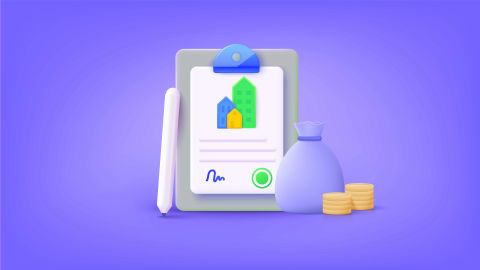Understanding the Loan-to-Value (LTV) ratio is essential when applying for a loan against property. LTV Calculator is a user-friendly online tool designed to help you determine your eligible loan amount based on your property's market value. By inputting details such as your employment type, property value, property type (residential or commercial), desired loan tenure, and applicable interest rate, the calculator provides an estimate of your EMIs, total interest payable, and a detailed repayment schedule. This tool empowers you to make informed financial decisions by offering clarity on your borrowing capacity and repayment obligations. Whether you're planning to fund a business expansion, manage educational expenses, or address personal financial needs, the LTV Calculator serves as a valuable resource in your loan planning process. Utilise this calculator to assess your loan eligibility and embark on your financial journey with confidence.
What is an LTV Calculator?
The Loan to Value (LTV) calculator is an online tool that can help you calculate your EMIs, eligible loan amount, total interest to be paid on the eligible loan amount, and the principal amount. You can even view the repayment schedule and apply for the loan against property.
You need to enter few details while using the LTV calculator. Select if you are salaried or self-employed individual, enter your property value, and choose if the property is residential or commercial, then enter the loan tenure for repaying the loan and interest rate of the loan. Once you enter these details, you will be able to view the EMIs and other information.
While the LTV calculator helps you understand your borrowing capacity, have you considered how a loan against property can turn your real estate into a financial springboard? Whether you are planning a dream business expansion or tackling long-term goals, leveraging your property is a smart and secure way to access significant funds. By using your property as collateral, you can unlock access to large funds of up to Rs. 10.50 crore—it is a smart way to manage your finances with ease! Get funds within 72 hours* of approval.
What is LTV formula?
The formula that a loan to value ratio calculator uses to calculate your loan’s LTV ratio is:
LTV= principal amount/ market value of your property.
So if the loan amount is Rs. 50 lakh and the property’s worth after valuation is Rs. 1 crore, the maximum LTV= Rs. 50 lakh/ Rs. 1 crore= 50%.
What is a good LTV ratio?
A good Loan-to-Value (LTV) ratio typically depends on the type of loan and lender policies. Generally, an LTV ratio of 70-80% is considered ideal, as it indicates the loan amount is proportionate to the value of the property. A lower LTV ratio suggests reduced risk for lenders, as the borrower has more equity in the property. For borrowers, maintaining a good LTV ratio allows easier loan approvals and better interest rates. A high LTV ratio (above 90%) may lead to higher interest rates or the requirement for additional insurance, as it indicates increased risk for lenders.
How to use LTV ratio calculator online?
Here is how to use an LTV ratio calculator online in simple steps:
- Access the calculator: Go to a trusted online LTV ratio calculator, such as one from a bank or financial website.
- Enter property value: Input the current market value of the property you’re using as collateral.
- Enter loan amount: Enter the loan amount you wish to borrow or are considering for the property.
- Calculate: Click on the “Calculate” button to get the LTV ratio.
- Interpret results: The calculator will show the LTV ratio. A lower ratio suggests better loan terms, while a higher ratio may result in stricter conditions.
What is a typical LTV?
A typical Loan-to-Value (LTV) ratio varies depending on the type of loan and lender requirements. For conventional home loans, a standard LTV ratio is usually 80%, meaning you must make a down payment of 20%. This ratio is considered ideal for securing favorable loan terms, including lower interest rates. However, some lenders may approve loans with a higher LTV ratio, such as 90% or 95%, especially for first-time homebuyers or government-backed loans like FHA. Keep in mind that a higher LTV may lead to higher interest rates or the need for private mortgage insurance (PMI) to protect the lender.
Your property is not just a home or office—it is a powerhouse of opportunities. With a loan against property, you can finance your next big move, whether it is a personal milestone or a business breakthrough. Use the LTV calculator to begin your journey toward unlocking this potential today. With a Bajaj Finserv Loan Against Property, you can unlock high-value funding at competitive interest rates. Whether it is for medical emergencies, business growth, or personal goals, your property empowers you to access the resources you need with ease. Get a loan of up to Rs. 10.50 crore with the option of interest-only EMIs during the initial tenure.
Factors that affect LTV calculation
The Loan-to-Value (LTV) ratio determines the maximum loan amount you can borrow against the value of your property. Several factors influence the LTV calculation, including:
1. Type of property
Residential properties typically have a higher LTV ratio (up to 80%) compared to commercial properties (up to 60-70%). The location and condition of the property also play a significant role in determining its market value.
2. Market value of the property
The current market value of your property is a crucial factor. Lenders evaluate this through property appraisals conducted by certified professionals.
3. Purpose of the loan
LTV may vary depending on whether the loan is for personal use, business expansion, or debt consolidation.
4. Borrower’s creditworthiness
A strong credit score and a stable financial history can influence the lender to offer a higher LTV ratio.
5. Loan tenure
Longer loan tenures may lead to a reduced LTV ratio as they carry higher financial risk for the lender.
6. Lender policies and regulations
Each financial institution has its own policies regarding maximum LTV limits, often influenced by regulatory guidelines and market trends.
Benefits of loan-to-value
The Loan-to-Value (LTV) ratio offers numerous advantages for both lenders and borrowers, ensuring a balanced and secure borrowing experience. Key benefits include:
- Risk assessment for lenders: The LTV ratio helps lenders evaluate the risk of a loan by comparing the loan amount to the property’s market value. A lower LTV indicates lower risk.
- Access to higher loan amounts: Borrowers with a favourable LTV can access higher loan amounts, improving their financial flexibility.
- Better interest rates: A lower LTV often qualifies borrowers for better interest rates, reducing repayment costs.
- Equity utilisation: Borrowers can leverage their property equity for various financial needs, such as home improvements, education, or emergencies.
- Financial security: A good LTV ratio allows for financial security by ensuring manageable loan repayment terms.
Understanding LTV ratios is a vital step, but why stop there? A loan against property bridges the gap between what you have and what you need. With attractive terms and easy access, it is the perfect tool to turn your property into a means for achieving your goals. Leverage the power of your property to fulfil multiple financial needs. Get a loan against property with simple application process.
Loan to value calculator FAQs
The loan to value ratio is generally higher for a residential property than it is for a commercial property. On average, can expect the LTV ratio to be around 10% higher for residential spaces. However, certain industrial properties can also fetch a high LTV. Moreover, the LTV ratio depends on occupancy status as well. Occupied premises tend to yield higher loan amounts than rented or vacant ones, irrespective of whether it’s a residential or commercial property.
Before settling on the LTV, mortgage loan lenders check parameters like your age, current financial obligations and credit score. The greater the number of working years you have, the better are your chances of getting a large loan amount and a lengthy tenor too. Similarly, you should have a low debt-to-income ratio, under 50%, to get a high Loan against Property comfortably. Your credit score is also of importance as it reflects your credit management abilities. Normally, scores of 700 and above fetch higher LTV ratios and low loan against property interest rates as well.
In the case of a second mortgage, you have a cumulative loan to value ratio. Here the principal of both loans is added and then divided by the market value of the property. So, if your initial loan was worth Rs. 50 lakh, your new one is worth Rs. 10 lakh and your property’s appraised value is Rs. 1 crore, then the cumulative LTV ratio is 60%.
Keep this information on LTV ratios handy to make a smart Loan against Property borrowing decision.
Yes, a lower Loan-to-Value (LTV) ratio typically leads to better loan terms. It reduces lender risk, making them more likely to offer lower interest rates, higher loan amounts, or better repayment options.
Property valuation directly impacts the LTV ratio. A higher property value increases the loan amount you can borrow, lowering the LTV ratio, while a lower valuation raises the LTV ratio.
A high LTV ratio indicates higher risk for the lender, which could result in higher interest rates, stricter loan terms, or even loan denial. It may also require private mortgage insurance (PMI).
To calculate 75% LTV, multiply the property’s market value by 0.75. For example, if your property is worth Rs. 50 lakhs, your loan eligibility would be Rs. 37.5 lakhs.
90% LTV means the loan amount is 90% of the property’s value. For a property worth Rs. 40 lakhs, the loan amount would be Rs. 36 lakhs, with 10% as equity.
You can reduce LTV by offering a higher down payment, improving your creditworthiness, or selecting a property with a higher market value relative to the loan amount required.
High LTV is risky as it increases the lender’s exposure, leading to higher interest rates, stricter terms, and a greater likelihood of default in case of financial instability.








